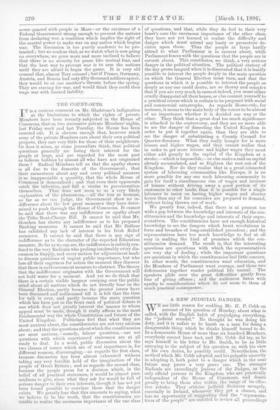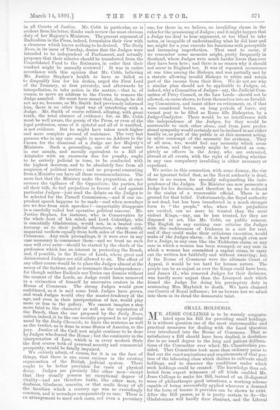A NEW JUDICIAL DANGER.
WE see little reason for scolding Mr. H. P. Cobb on account of his question of Monday, about what is called, with the English habit of prejudging everything, the "judicial scandal," He thought ho was doing his duty, and it is unfair to be harsh on a man for doing a disagreeable thing which he thinks himself bound to do. In a democratic House of more than six hundred Members, everybody cannot have tact, and Mr. Cobb did try, as he says himself in his letter to Mr. Smith, to be as little annoying to the subject of his question as, with his view of his own duties, he possibly could. Nevertheless, the method which Mr. Cobb adopted, and his palpable sincerity in adopting it, both point to a danger which in the near future may prove a very grave one. The stronger Radicals are exceedingly jealous of the Judges, as the only official persons in the Kingdom who are practically independent of the House of Commons, and desire greatly to bring them also within the range of its effec- tive rebuke. They criticise judicial decisions savagely, especially in Ireland, whenever they get a chance, and lose no opportunity of suggesting that the "representa- tives of the people " are entitled to review all proceedings in all Courts of Justice. Mr. Cobb in particular, as is evident from his letter, thinks such review the most obvious duty of her Majesty's Ministers. The gravest exponent of Radicalism in the Press, indeed, formulates their view with a clearness which leaves nothing to be desired. The Daily News, in its issue of Tuesday, denies that the Judges were intended to be independent of Parliament, and actually proposes that their salaries should be transferred from the Consolidated Fund to the Estimates, in order that their conduct might be annually reviewed ! It was in entire accordance with this opinion that Mr. Cobb, believing Mr. Justice Stephen's health to have so failed as to disqualify him for his duties, urged the First Lord of the Treasury, at first privately, and afterwards by interpolation, to take action in the matter,—that is, of course, to move an address to the Crown to remove the Judge assailed. He must have meant that, though he did not say so, because, as Mr. Smith had previously informed him, there is no other legal way of interfering with a Judge. Mr. Smith of course refused, alleging, with great truth, the total absence of evidence ; for, as Mr. Cobb must be well aware, the gossip of the Press, or oven of the legal profession, some of it spiteful and all of it unsifted, is not evidence. But he might have taken much higher and more complete ground of resistance. The very last persons who in any case ought to move an Address to the Crown for the dismissal of a Judge are her Majesty's Ministers. Such a proceeding, one of the most rare in our annals, and morally equivalent to a Bill of Attainder with an enormous fine for penalty, ought to be entirely judicial in tone, to be conducted with the highest decorum, and to be absolutely free from all suspicion of political motive ; and no proposal emanating from a. Ministry can have all those recommendations. The mere fact that the Ministry make the proposition, at once arouses the vigilance of the Opposition; the parties, for all their talk, do feel prejudices in favour of and against particular Judges—just read the debate on the Judges to be selected for the Parnell Commission,—and if one im- prudent speech happens to be made—and when nowadays are we free from such speeches ?—impartiality disappears in a carefully veiled but operative political rancour. Mr. Justice Stephen, for instance, who is Conservative by the whole bent of his mind, and Lord Coleridge, who is essentially Gladstonian, would not, in a heated con- troversy as to their judicial characters, obtain coldly impartial verdicts equally from both sides of the House of Commons. Any such proceedings, it it were ever in any case necessary to commence them—and we trust no such case will ever arise—should be started by the chiefs of the profession which has an interest in protecting the Bench, and, if possible, in the House of Lords, where great and disinterested Judges are still allowed to sit. The effect of any other course would be to place the Judges almost at the mercy of the factions, and so terminate their independence ; for though neither Radicals nor Tories can dismiss without the consent of the Lords, no Judge could listen unmoved to a vivisection of himself, by successive orators in the House of Commons. The strong Judges would grow embittered, as it is said some Irish Judges have grown, and weak Judges would obey the master-tendency of the age, and even in their interpretation of law, would play more or less to the gallery. We cannot imagine a step more fatal to the character as well as the reputation of the Bench, than the one proposed by the Daily News, indeed, ndeed, it be the one recently proposed in no jocular mood by the Daily Chronicle, to leave the sentence as well as the verdict, as is done in some States of America, to the jury. Justice of the Cadi sort might continue to be done by Judges who feared the House ; but the continuity in the interpretation of Law, which is in every modern State the first source both of personal security and commercial prosperity, would be fatally impaired. We entirely admit, of course, for it is on the face of things, that there is one casus omisaus in the existing organisation of the British judicial system. There ought to be better provision for cases of physical decay. Judges are precisely like other men—except that they usually possess an exceptional degree of vitality—and are therefore liable, like other men, to deafness, blindness, amentia, or that senile decay of all the faculties which a century ago was so exceedingly common, and is nowadays comparatively so rare. There is no arrangement to meet such cases, not even a pecuniary one, for there is, we believe, no invaliding clause in the rules for the pensioning of Judges ; and it might happen that a Judge too deaf to hear argument, or too blind to take notes, or incapable of understanding what he did hear and see, might for a year execute his functions with perceptible and increasing imperfection. That used to occur, if we remember some memoirs aright, pretty frequently in Scotland, where Judges were much harder livers than ever they have been here ; and there is no reason why it should not occur in England too. It was of repeated occurrence at one time among the Bishops, and was partially met by a statute allowing invalid Bishops to retire and retain part of the income from their Sees. We do not see why a similar plan should not be applicable to Judges, or, indeed, why a Committee of Judges—say, the Judicial Com- mittee of Privy Council, or the Law Lords—should not be allowed, on cause shown, to form themselves into an Invalid- ing Commission, and insist either on retirement, or, if that were considered. bettor, on long periods of leave, any vacant post to be filled as Rome fills Bishoprics, by a Judge-Coadjutor. There would be no interference with the independence of the Judges, for they would be answerable to each other alone, and from pure profes- sional sympathy would certainly not be inclined to act either hastily or, as part of the public is at this moment acting, in utter contempt of the necessity for evidence. They of all men, too, would feel any necessity which arose for action, and they surely might be trusted as com- pletely as officers in the Army, who are entrusted, abroad at all events, with the right of deciding whether in any case compulsory invaliding is either necessary or expedient.
We notice in this connection, with some dismay, the rise of an ignorant belief that, as the Royal authority is dead, there is no reason for specially safeguarding the inde- pendence of the Judges. No Minister can now persecute a Judge for his decision, and therefore he may be reduced to the status of a removeablo official. There is no ground for that belief. Unfortunately, the Royal authority is not dead, but has been transferred in a much stronger form to " the people," who, when their prejudices are excited, can no more be trusted than the most violent Kings,—nay, can be less trusted, for they are disposed to act, like Mr. Cobb, on public rumour. The English in any exciting case criticise the Judges with the recklessness of Irishmen in a suit for rent, i and if they could make their criticisms executive, 'would make of the Judges slaves. It is hard enough even now for a Judge, in any case like the Tichborne claim, or any i case in which a woman has been wronged, or auy case in which a woman has committed a capital crime, to carry out the written law faithfully and without swerving ; but if the House of Commons were the ultimate Court of Appeal, it would be too hard for human nature. The people can be as unjust as ever the Kings could have been, and James II., who removed Judges for their decisions, was hardly more unjust than the Liverpool mob which hissed the Judge for doing his peremptory duty in sentencing Mrs. Maybrick to death. We have cleansed our Courts of Royal influence ; let us beware lest we admit into them in its stead the democratic taint.



































 Previous page
Previous page